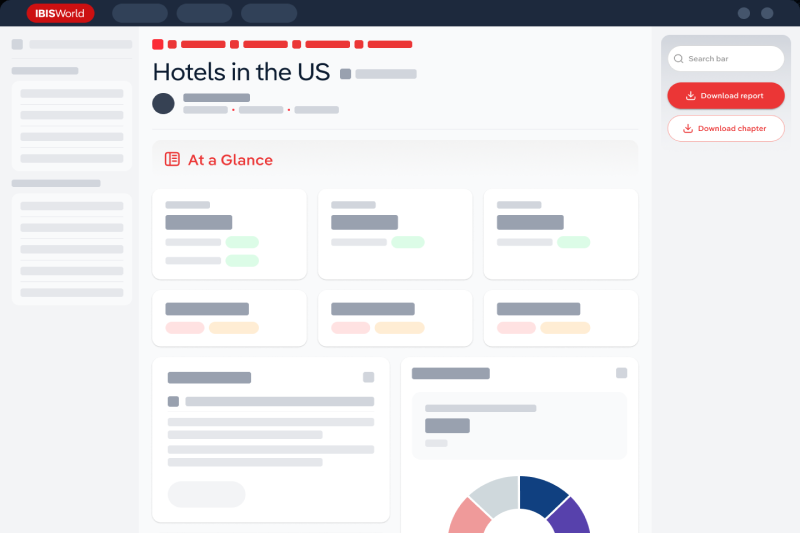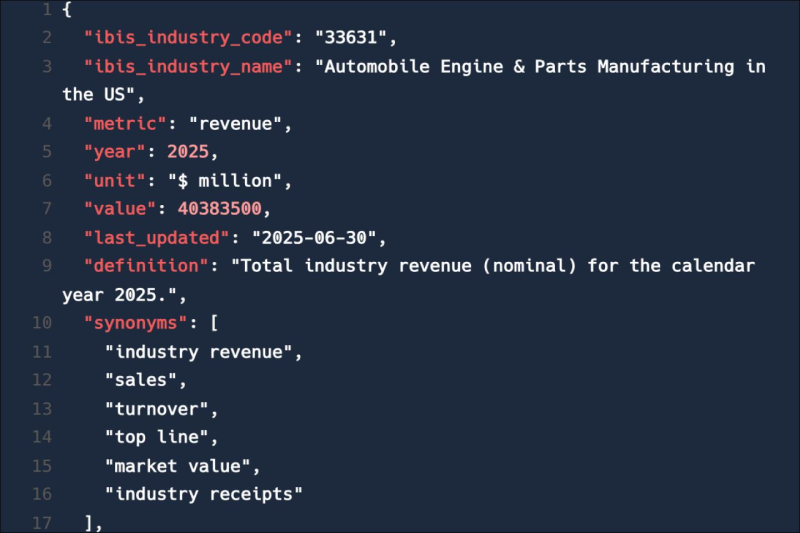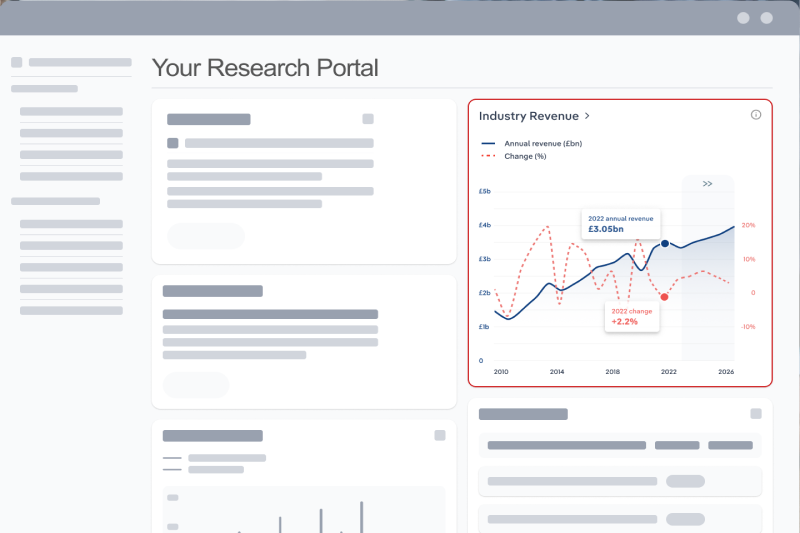IBISWorld Platform
Answer any industry question in minutes with our entire database at your fingertips.

Travelling with motorhomes and caravans has become increasingly popular in recent years. This trend has been accelerated by the coronavirus pandemic, as self-sufficient, low-contact travelling has become more popular. As a result, industry turnover has risen during the coronavirus pandemic, which has largely paralysed tourism. The industry is benefiting from the popularity of camping holidays, as can be seen from the increasing number of camping holidaymakers renting or buying leisure vehicles. In recent years, an increasing number of customers have favoured buying a motorhome over renting one. Demand for motorhomes and caravans reached a temporary peak in 2023. Subsequently, industry sales declined significantly. These developments have contributed to the fact that the turnover of motorhome and caravan manufacturers has grown by an average of 1.2% per year over the past five years. For 2025, sales are expected to fall by 5.6% compared to the previous year, which means that industry sales are expected to reach 5.4 billion euros.

Answer any industry question in minutes with our entire database at your fingertips.

Feed trusted, human-driven industry intelligence straight into your platform.

Streamline your workflow with IBISWorld’s intelligence built into your toolkit.
IBISWorld's research coverage on the Recreational Vehicle Manufacturing industry in Germany includes market sizing, forecasting, data and analysis from 2015-2030. The most recent publication was released June 2025.
The Recreational Vehicle Manufacturing industry in Germany operates under the WZ industry code SP29.01DE. The industry comprises the manufacture of towable and motorised leisure vehicles. The motorhome falls under the motorised category of leisure vehicles and usually includes a sleeping area, a kitchen and sanitary facilities. The caravan is a trailer without motorised drive. It is equipped with similar facilities to the motorhome. A towing vehicle is required to move a caravan. Related terms covered in the Recreational Vehicle Manufacturing industry in Germany include caravan and glamping.
Products and services covered in Recreational Vehicle Manufacturing industry in Germany include Motorhomes with cubic capacity between 1,500 and 2,500 cm³, Motorhomes with an engine capacity of over 2,500 cm³ and Folding caravans weighing less than 1,600 kg.
The Recreational Vehicle Manufacturing industry in Germany is highly fragmented with no companies holding a market share greater than 5%.
The Performance chapter covers detailed analysis, datasets, detailed current performance, sources of volatility and an outlook with forecasts for the Recreational Vehicle Manufacturing industry in Germany.
Questions answered in this chapter include what's driving current industry performance, what influences industry volatility, how do successful businesses overcome volatility, what's driving the industry outlook. This analysis is supported with data and statistics on industry revenues, costs, profits, businesses and employees.
The Products and Markets chapter covers detailed product and service segmentation, analysis of major markets and international trade data for the for the Recreational Vehicle Manufacturing industry in Germany.
Questions answered in this chapter include how are the industry's products and services performing, what are innovations in industry products and services, what products or services do successful businesses offer and what's influencing demand from the industry's markets. This includes data and statistics on industry revenues by product and service segmentation and major markets.
The Geographic Breakdown chapter covers detailed analysis and datasets on regional performance of the Recreational Vehicle Manufacturing industry in Germany.
Questions answered in this chapter include where are industry businesses located and how do businesses use location to their advantage. This includes data and statistics on industry revenues by location.
The Competitive Forces chapter covers the concentration, barriers to entry and supplier and buyer profiles in the Recreational Vehicle Manufacturing industry in Germany. This includes data and statistics on industry market share concentration, barriers to entry, substitute products and buyer & supplier power.
Questions answered in this chapter include what impacts the industry's market share concentration, how do successful businesses handle concentration, what challenges do potential industry entrants face, how can potential entrants overcome barriers to entry, what are substitutes for industry services, how do successful businesses compete with substitutes and what power do buyers and suppliers have over the industry and how do successful businesses manage buyer & supplier power.
The Companies chapter covers Key Takeaways, Market Share and Companies in the Recreational Vehicle Manufacturing industry in Germany. This includes data and analysis on companies operating in the industry that hold a market share greater than 5%.
Questions answered in this chapter include what companies have a meaningful market share and how each company is performing.
The External Environment chapter covers Key Takeaways, External Drivers, Regulation & Policy and Assistance in the Recreational Vehicle Manufacturing industry in Germany. This includes data and statistics on factors impacting industry revenue such as economic indicators, regulation, policy and assistance programs.
Questions answered in this chapter include what demographic and macroeconomic factors impact the industry, what regulations impact the industry, what assistance is available to this industry.
The Financial Benchmarks chapter covers Key Takeaways, Cost Structure, Financial Ratios, Valuation Multiples and Key Ratios in the Recreational Vehicle Manufacturing industry in Germany. This includes financial data and statistics on industry performance including key cost inputs, profitability, key financial ratios and enterprise value multiples.
Questions answered in this chapter include what trends impact industry costs and how financial ratios have changed overtime.
The Industry Data chapter includes 10 years of historical data with 5 years of forecast data covering statistics like revenue, industry value add, establishments, enterprises, employment and wages in the Recreational Vehicle Manufacturing industry in Germany.
More than 6,000 businesses use IBISWorld to shape local and global economies
We were able to supplement our reports with IBISWorld’s information from both a qualitative and quantitative standpoint. All of our reporting now features some level of IBISWorld integration.

IBISWorld delivers the crisp business knowledge we need to drive our business. Whether it be serving up our major clients, winning new business or educating on industry issues, IBISWorld brings real value.

IBISWorld has revolutionised business information — which has proved commercially invaluable to exporters, investors and public policy professionals in Australia and overseas.

When you’re able to speak to clients and be knowledgeable about what they do and the state that they operate in, they’re going to trust you a lot more.

The market size of the Recreational Vehicle Manufacturing industry in Germany is €5.4bn in 2026.
There are 52 businesses in the Recreational Vehicle Manufacturing industry in Germany, which has grown at a CAGR of 3.4 % between 2020 and 2025.
The market size of the Recreational Vehicle Manufacturing industry in Germany has been growing at a CAGR of 1.2 % between 2020 and 2025.
Over the next five years, the Recreational Vehicle Manufacturing industry in Germany is expected to grow.
Manufacture of mobile homes and Manufacture of caravans are part of the Recreational Vehicle Manufacturing industry in Germany.




